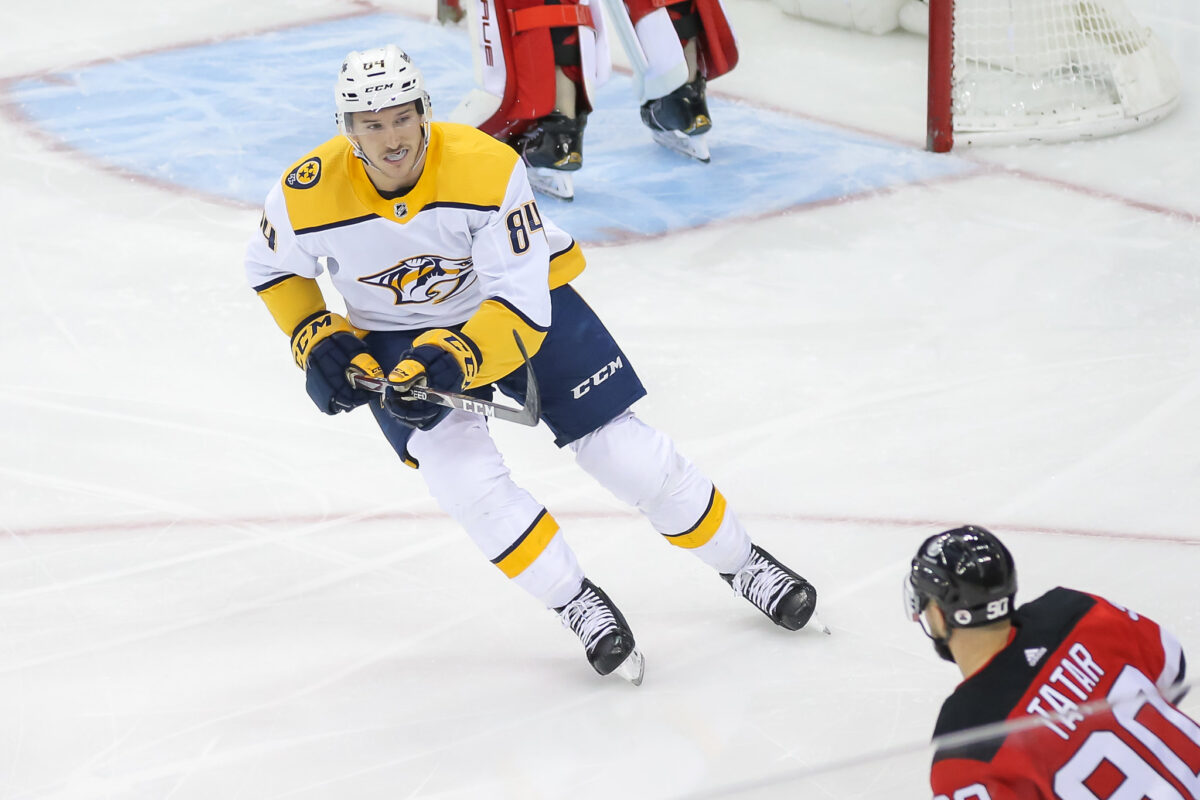It’s a story like none other in Nashville Predators history, and one likely to never be repeated.
Undrafted players succeeding in the National Hockey League isn’t an uncommon practice. From Hall of Fame inductees like Ed Belfour, Dino Ciccarelli, and Adam Oates to current players like Sergei Bobrovsky, Yanni Gourde, and Mark Giordano, the league has had its fair share of remarkable athletes who were passed up in the draft.
For Nashville, we’ve seen Rich Peverley and Vernon Fiddler go on to have decent careers after going undrafted and signing with the Predators, and Cody McLeod, an undrafted veteran, played a handful of games with the team after spending his first ten seasons with the Colorado Avalanche. Both he and Fiddler would be a part of a Predators’ fourth-line that created mayhem.
Then, there’s Tanner Jeannot.
Related: Predators New Year’s Resolutions For 2022
At 24, Jeannot is one of the oldest rookies among those who are top-10 in scoring, along with 24-year-old Jonathan Dahlen and 26-year-old Michael Bunting. Jeannot appeared in 15 games last season, on the final year of his entry-level contract, and scored five goals while averaging just over 12 minutes of ice time. While his shooting percentage was alarmingly-high at 21.7% (5 goals on 23 shots), fans appreciated his all-around play. In came a 23-year-old who could not only score on the bottom-six but someone who could hit, block shots and drop the gloves if he had to. A real power forward in the making. His efforts earned him a two-year deal and a slight rise in salary, giving Predators fans hope for a deeper team heading into the 2021-22 season. What came next is something not only fans in Nashville have come to appreciate, but everyone across the league.

After an injury-side-lined forward Mathieu Olivier, Jeannot stepped in to fill the hole on the third line. His play with teammates Yakov Trenin and Colton Sissons impressed the coaching staff enough to keep Jeannot in the line-up, even after Olivier was reactivated. Olivier was sent down to the AHL last week, and Jeannot hasn’t looked back since.
With injuries and COVID-19 protocols, Nashville’s roster has become somewhat depleted. Filip Forsberg, the latest victim of the virus, left a glaring hole on the team’s top-six, and who else but Jeannot to step in and fill the void. In his first game on the second line, playing with Mikael Granlund and Matt Duchene, Jeannot had himself a game that can only be described as Jeannot-esque. One goal on one shot, two hits, two blocks, a minor penalty, and a misconduct.
It’s what the crowd in Nashville has grown used to. A big, tough forward who can score and punch face. It almost seems too good to be true to consider him for a Calder Trophy nomination… or is it?
His Competition
The 2021-22 season is chock-full of excellent candidates for Rookie of the Year. The Detroit Red Wings alone boast two of the most promising young guns in forward Lucas Raymond and defenseman Moritz Seider, who are first and third respectively among all rookies for points. Raymond, who stepped into the Red Wings lineup as a 19-year-old, replaced an injured Jakub Vrana on Detroit’s top line, playing with Tyler Bertuzzi and Dylan Larkin. What happened next was nothing short of remarkable, as he quickly became a big reason as to why the Red Wings are in contention for a wild card spot. On the other side of the coin, Seider has showcased his full ability on the blue line, quickly becoming Detroit’s best defenseman in under half a season.

Anaheim Ducks have their own 1-2 rookie combo, starring forward Trevor Zegras, who closes out the top-three in rookie scoring, and defenseman Jamie Drysdale. Zegras has become one of the most entertaining players to watch, not just in the Western Conference, but the entire league. Whether he’s setting up a goal of the year or gliding up and down the ice with his dangles and crossovers, he’s quickly become a player everyone wants to watch on a nightly basis. Drysdale, who went from playing 25 minutes a night with the Erie Otters to 18-20 minutes a night with the Anaheim Ducks, has been a steadying presence on the back-end. His calm, mature style of play has aided the Ducks in staying in games they have no business being a part of.
Then there’s Jeannot, who quietly lurks the rookie scoring race, sitting fourth in points. Just one point behind Seider, it’s not impossible he ends up finishing top-3, but how good are his chances of being a finalist for the Calder? It’s a mix of number crunching and ability to aid his team to achieve the ultimate goal, something we take a look at and break down to see what his potential of competing with the likes of Raymond, Zegras, and Seider.
The Leaderboard
In the first set of numbers, we take a look at are the obvious ones; Goals, Assists, and Points. Along with that, we dive a bit deeper in terms of metrics in terms of even-strength contributions compared to powerplay and shorthanded statistics. While very basic to begin with, it sets the stage for just how close the rookie race can end up being by the season’s end. The limit for minimum games played is set to 25, here’s what the numbers tell us.
In terms of goals, Jeannot sits atop the leaderboard:
- Jeannot (11)
- Raymond (10)
- Zegras (8)
- Mercer (9)
- Dahlen (8)
- Bunting (7)
When it comes to picking up assists, he ranks just outside the top-5:
- Seider (20)
- Raymond (20)
- Zegras (18)
- Bunting (13)
- Drysdale (13)
- Jeannot (11)
And as mentioned earlier, Jeannot sits inside the top-5 for points:
- Raymond (30)
- Zegras (27)
- Seider (23)
- Jeannot (22)
- Bunting (20)
- Mercer (20)
Of Jeannot’s 11 goals this season, 10 have come at even-strength. This ranks him in 1st among rookies in that statistic, three ahead of Raymond, Dahlen, Dawson Mercer, Anton Lundell, and Vasily Podkolzin. Despite leading all rookies in goals and 4th in points, Jeannot averages a measly 0:23 of powerplay time. In comparison, Seider leads all rookies with 2:47 in that regard, while Raymond averages 2:42. The three players ahead of Jeannot all average two minutes or more of powerplay ice time. One thing none of those players stand a chance at surpassing Jeannot, however, is the ability to use fisticuffs when the team needs a spark or retribution is required.
Meanwhile, Jeannot has averaged 2:25 of shorthanded time on ice, placing him 4th among rookies. Jeannot’s innate abilities to use his body to separate players from the puck or to block shots, paired with his mindfulness when using his stick to take away passing lanes, has made him one of the better penalty killers in the league.
And don’t get us started on zone starts.
While these are statistics from Jan 5th, the numbers still tell a story that is worth bringing to light.
Despite starting less than a quarter of his shifts in the defensive zone compared to the offensive zone, Jeannot is still remaining on top of the leaderboard for goals. He averages a total of 15:37 time on ice, which is 11th among all rookies, playing on a third line with Sissons and Trenin while his competition eats up top-six minutes with some of their team’s best points producers.
Oh, and he leads all rookies and hits with 114. The player who sits in 2nd place, Martin Fehervary, has 90. Like we mentioned earlier, a true power forward in the making.
The Realistic Approach
With all that said, it’s going to be a difficult argument to make in Jeannot’s case when compared to his competition. While his offensive outburst has been impressive, the defensive side of his game has taken a hit. Particularly due to the high amount of defensive-zone starts, and quality of competition, facing opposition’s better forwards and working the penalty kill, Jeannot can be exposed to this if detractors want to find a negative spin on his play.
Generally speaking, the scale always tips in favour of statistical category leaders and while we can consider Jeannot’s spot in the goals department, his 20% shooting percentage will be hard to maintain, and so be it his hold on the scoring lead. When compared to players like Raymond and Zegras, who both get ample time on the powerplay and Seider’s workhorse schedule of 20+ minutes a night, it seems like only a matter of time before Jeannot loses that grip and falls behind one or two of these rookies. While a top-3 or top-5 finish is realistic, barring any major injury or pandemic protocol that side-lines him for an extended period of time, his participation in the Calder Trophy race isn’t as appealing as some of the bigger names.

There’s the top-6 forwards with flashy hands and highlight-reel goals, defensemen who log big minutes and numbers, and then there’s Jeannot; a reliable bottom-six player who can be a consistent, reliable player that can score goals and throw big hits and bigger punches. Is he a guaranteed fixture in the finalists for rookie of the year? No. But should he be considered? Absolutely. Of the top five rookies entering this season, he may be the only one appearing in post-season action. An observation that often goes overlooked when considering a player’s worth in individual awards.
Calder Trophy or not, one thing is for certain and that is Jeannot has become a household name in the city of Nashville. One that won’t soon be forgotten, and one that fans across the league will recognize as the season, and his career, continue.
